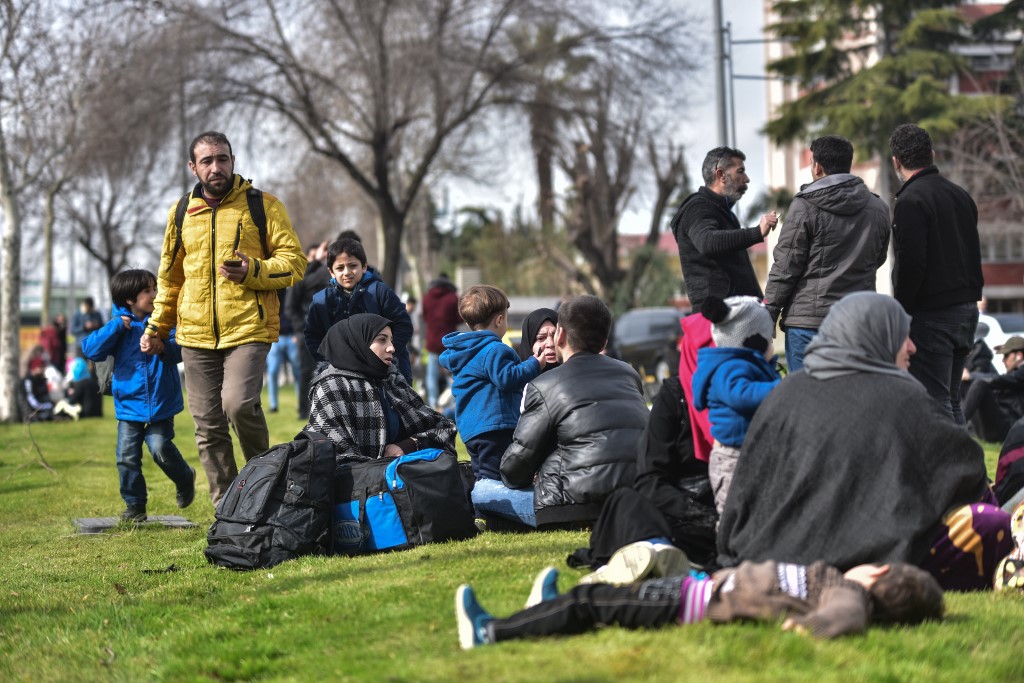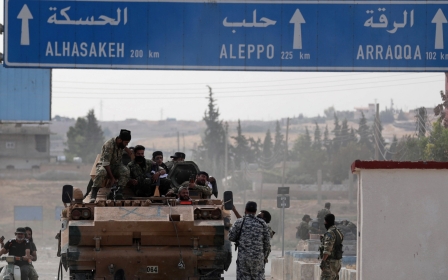There is no lasting solution in sight for the Idlib debacle

The Russian-Syrian military campaign in Idlib has driven close to a million people towards Turkey’s borders. Ankara is now facing a humanitarian catastrophe along its borders and the prospect of a significantly weakened position in Syria.
To lessen these pressures, Turkish President Recep Tayyip Erdogan set a deadline for Syrian regime forces to withdraw from Idlib’s de-escalation zone by the end of February. The call wasn’t heeded. Syrian and Russian forces pressed ahead with their offensive, gaining a significant chunk of strategically important locations from the opposition.
On 27 February, an air strike on a Turkish military convoy killed at least 34 soldiers, prompting Ankara to launch a major military campaign against the Syrian regime. In addition, unhappy with the lack of support for Turkey from the EU and US on Idlib, Ankara decided to open its borders to Europe, allowing refugees to pass through.
Attacking the Syrian regime
As Turkey strives to internationalise the conflict, this policy aimed to push Europe to put more pressure on Russia for a deal - but it has yet to produce any tangible results.
Stay informed with MEE's newsletters
Sign up to get the latest alerts, insights and analysis, starting with Turkey Unpacked
At the same time, Turkey’s increased military attacks on Syrian regime targets have resulted in numerous casualties and the degradation of Syrian military infrastructure. Still, Turkey is far from attaining its goal of pushing the regime behind the so-called Sochi lines.
While these attacks make the prospect of a Moscow-Ankara deal more likely, such a deal would probably not deliver on Turkey’s strategic goals in Idlib or address its major challenges, such as what to do with Hayat Tahrir al-Sham (HTS) fighters.
If the sides can't find a middle ground, tensions in Idlib will soar, and Russia's limited permissiveness of Turkey's operation will disappear
With Erdogan and Russian President Vladimir Putin set to meet on Thursday in Moscow, at best, what we can expect is some form of a deal that can freeze the conflict temporarily - hence buying Turkey some time.
However, this deal is unlikely to provide any sustainable solution to the crisis. In fact, in Syria, the gap between deals and solutions are widening - Thursday's meeting is unlikely to prove to be an exception in this respect.
Any deal, therefore, would be fragile, and if the two leaders fail to reach a deal, then bilateral tensions and the prospect of a longer conflict between Turkey and the Syrian regime will significantly increase.
At this stage, Turkey has a number of possible options for the situation in Idlib. Firstly, it can continue to try to internationalise the crisis as much as possible.
Erdogan and other Turkish officials have been talking with their western counterparts. From the US, Turkey wants Patriot missiles and preferably the US pounding of Syrian regime targets and imposing sanctions on Russia and the regime. From Europe, Turkey wants states to share the refugee burden and put more pressure and sanctions on Russia.
On Turkey’s quest to acquire air defence systems from the US, its previous acquisition of Russian S-400 missiles presents a major thorn, but this does not necessarily prevent the US from lending these missiles to Turkey for a limited period of time. The US decision on this file will indicate to Ankara whether Washington will go beyond discursive support to Turkey.
It would appear that the US wants to avoid any prospect of its missiles being used to strike Russian jets. At this point, anything Turkey gets from the US will be limited, and hence not a game-changer in Idlib.
Opening Turkey's borders for refugees
Secondly, Turkey can drive up the costs of inaction for Europe. By opening its borders for refugees to go to Europe, Turkey is effectively telling Europeans that it will not bear the costs of the unfolding humanitarian catastrophe alone.
But this strategy is risky: unlike several years ago, when millions of refugees aimed to cross into Europe, Syrian refugees have now been in Turkey for years and are less likely to risk what they have in Turkey for the unknown.
Putting aside the moral, political and reputational costs, Turkey’s open borders will not prompt a voluntary exodus of Syrian refugees towards Europe.
New waves of refugees from Idlib who do not have established networks in Turkey are more likely to head towards Europe via Turkey, but this move isn’t risk-free either. The response of Greek authorities to attempts by refugees to reach EU territory by land or sea have been swift and brutal, making such efforts difficult and very possibly fruitless.
Though morally reprehensible, the weaponisation of refugees has thus far proved very effective, putting pressure on the Europeans to craft a response on Idlib, though a muddled and inconsequential one. Turkey hopes to put more pressure on the EU, in order to create international momentum for a buffer zone or a safe zone in Idlib.
A third strategy for Ankara consists of establishing deterrence and driving up the costs for the Syrian regime and Russia. Since the deaths of dozens of Turkish soldiers, Ankara has dramatically intensified its campaign of attacks against the Syrian regime, with tacit Russian permission. In addition to acting as a form of deterrence for the Syrian regime, this makes a deal with Russia more likely.
Avoiding escalation with Russia
Fourthly, even after the Russian-Syrian bombing of the Turkish convoy last month, Ankara’s official discourse has been cautious and careful vis-a-vis Russia, instead turning the force of its firepower on the Syrian regime. Turkey will surely stick to this policy, avoiding further escalation with Russia. Ankara would only point the finger at Moscow if hopes for a deal were to vanish.
During Thursday’s meeting, the two sides will have to address thorny questions, such as the future of HTS, Turkey’s observation posts and the strategically important M4 highway. It is likely that there will be some kind of deal to freeze the conflict, taking into account the new battlefield realities.
But rather than Turkey’s desired Sochi lines, a deal with Russia would probably draw new lines between the Turkish-controlled area and that of the regime/Russia, including possibly joint patrols with Russia and a buffer zone for those fleeing Idlib.
Given the wide gulf between the sides, a modicum of caution is warranted. If the sides can’t find a middle ground, tensions in Idlib will soar, and Russia’s limited permissiveness of Turkey’s operation in recent days will disappear.
Given Russia’s control over Syrian airspace, Turkish military operations in Syria would thus carry grave risks, but would continue nonetheless, with Turkey striving to acquire more robust Western support in facing Russia and the Syrian regime even though they don’t seem to be forthcoming.
No lasting solution in sight
A deal between Turkey and Russia would provide breathing space for the Syrian opposition and lessen the pressure of the refugees on Turkey. But unless there is a safe zone, including a no-fly zone dimension, any deal would likely be temporary.
In addition, the inconsistency between Turkey’s different and often contradictory policies - towards the opposition, the regime and the Syrian Kurds - is likely to further bedevil Turkey’s Idlib strategy, but also its Syrian policy in general.
One can argue that in Syria, the boundaries between what is temporary and what is permanent - and what is strategic and what is tactical - are blurred.
With the Syrian war far from over, no matter what emerges from this week’s Putin-Erdogan meeting, there is no lasting solution in sight for the Idlib debacle. Ankara therefore has no good options; it must choose from a plethora of bad ones.
The views expressed in this article belong to the author and do not necessarily reflect the editorial policy of Middle East Eye.
Middle East Eye delivers independent and unrivalled coverage and analysis of the Middle East, North Africa and beyond. To learn more about republishing this content and the associated fees, please fill out this form. More about MEE can be found here.







